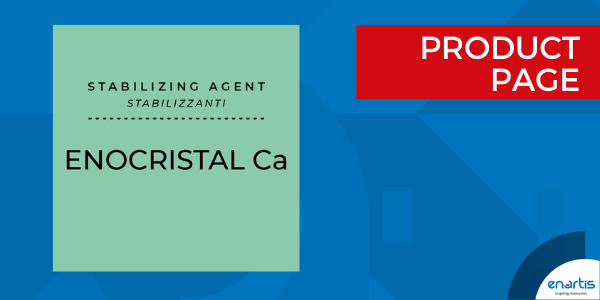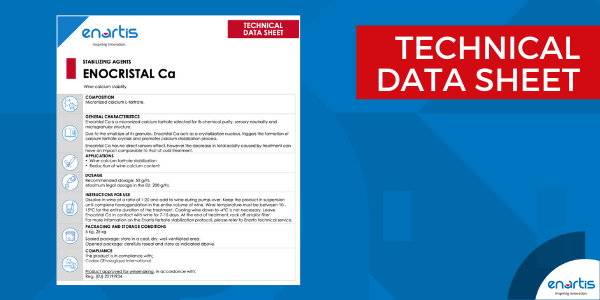Tartaric stabilization: how to avoid the precipitation of wine in the bottle?

The precipitation of calcium tartrate represents a new challenge that wine producers can now solve, simply and without changing the profile of their wines.
Calcium tartrate, which is easy to identify through observation under the microscope by the typical shape of the crystals, can be difficult to manage, due to the complexity of the factors that lead to its formation. It is common knowledge that in wine the solubility of CaT is ten times less than the solubility of KHT, and the concentration of calcium ion can vary between 40 and 150 mg / L. In addition, the process of forming this crystal is very slow and the decrease in temperature does not allow the process to be accelerated, as in the case of KHT.
Normally, calcium concentrations above 80 mg / L in white wines and 60 mg / L in red wines are considered to be at risk for the appearance of precipitates.
The calcium content alone is not sufficient for a correct assessment of the situation: it is also necessary to consider the pH and the concentration in tartaric acid. PH is the parameter that regulates the balance between tartaric acid (H2T), the bitartarate ion (HT-) and the tartrate ion (T2-): as it increases, the presence of the tartrate ion and the probability of formation of CaT increase as well. It is assumed that climate change is primarily responsible for the increase in the pH of wines.
Precipitation of calcium tartrate is becoming more frequent all over the world and causing both economic and brand damage that companies should be aware of. The cause of the problem is still unknown but may be found in climate change, viticultural and enological practices or the use of untreated concrete tanks. Whatever the origin, it is important to know how to identify wines that are potentially calcium unstable and how to treat them.
DO YOU WANT MORE INFORMATION?
Contact us by filling out the form to receive all information about Enartis products, shipping and delivery times and prices.
Enocristal Ca
The Enartis R&D group developed a quick method to estimate the instability of calcium and the consequent risk of the appearance of precipitates in the bottle. It consists of combining an analytical test with a multifactorial calculation plan.
The latter is based on a mathematical system capable of evaluating the impact of critical factors (pH, content of tartaric acid and calcium) and their synergistic effects. In parallel, the analytical test assesses the change in wine concentration after treatment with micronized calcium tartrate that acts as a nucleating agent in the formation of crystals. Forcing the crystallization process, it is possible to obtain a descriptive analysis of the CaT stability state in the analyzed wine.
The combination of the results of the analytical test and the multifactorial calculation plan allows to accurately describe the degree of stability of the wine.
The Enartis solution is based on the use of Enocristal Ca, a product based on highly micronized calcium tartrate, selected for its chemical purity, sensory neutrality and microgranular structure.
Due to the small size of its granules, Enocristal Ca acts as a crystallization nucleus, triggering the formation of calcium tartrate crystals and promoting the calcium stabilization process. Enocristal Ca has no direct sensory effect, however the slight decrease in total acidity caused by the treatment, can have an impact comparable to that of the treatment by cold.
Download Technical data sheet
DO YOU WANT MORE INFORMATION?
Contact us by filling out the form to receive all information about Enartis products, shipping and delivery times and prices.

